“Flowers give hope that God hasn’t given up hope on humanity” – Anonymous
Japan is known by many names. ‘The land of the rising sun’ however is the one that is most popular. So much so, that it is indeed the national emblem that adorns the national flag. It is one of Asia’s strongest economies and consists of a culture that spans thousands of years. Japanese culture can be described as the perfect fusion of east and west, amalgamating Western mechanization and Eastern family orientation and ethics.
Japan’s dual nature can be seen in its two national flowers. Unofficially the Cherry Blossom, or Sakura that blooms in the temperate summer months is considered a symbol of the Japanese people. However, for hundreds of years, the Japanese monarchy has used the Chrysanthemum as their official crest. In fact the ancient throne of the Emperor was called the ‘Chrysanthemum Throne’.
Flowers and floral arrangements are integral to Japanese culture. To the foreigner, Japanese culture is a mystery, often times wrapped in an enigma. A complex, formal system that is high on both politeness and ceremony, so sending flowers to Japan can be a very tricky business. It is therefore extremely important to understand the meanings of flowers to the Japanese people, in order to be able to gift flowers confidently and without committing an act of offense to the local people.
Popular Flowers In Japan And Their Meaning
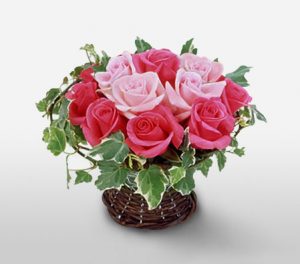
- The Red Rose is a powerful symbol of romance, love and passion.
- Red Carnations stand for familial love and are offered to mothers as tokens of affection.
- Japan’s ‘grave flower’ is the Red Spider Lily and is typically offered as offerings to the souls and planted on grave sites.
- The White Rose stands for innocence, purity and silence.
- Red Tulips, wildly popular in Japan are said to stand for popularity and fame.
- If you’re looking to thank someone, gift them a Bluebell, as it stands for gratitude.
- The White Chrysanthemum stands for mourning and is a common flower in Japan to include in a funeral wreath.
Popular Flower Gifting Days In Japan
The Japanese have an active social and celebratory culture, molded on the West. And like in the West, these occasions and celebrations too are marked by the gifting of floral arrangements and bouquets. Below is the complete guide on important festivals and popular flowers that are a part of these celebrations.
Valentine’s Day
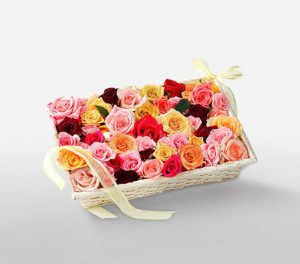
February 14th celebrated the world over as Valentine’s Day is an adopted tradition in Japan. It is massively popular among the younger, Western oriented Japanese. Every year, young Japanese couples will gift each other flowers, candy and stuffed plush toys, like in every corner of the world. The symbolism too is more or less the same. In fact like in the West, flower meanings and symbols of love in Japan too, are the same. The king of Valentine’s Day floral arrangements of course is the Red Rose. Tube Roses too are extremely popular. Some of the other flowers that vie for the Japanese consumer’s attention include Carnations and Lilies. But bet on the Red Rose and there is no way your Japanese girlfriend is not going to be impressed.

Red Roses are the flowers of love, and on the day of love if you find yourself wanting to make a splash, think about ordering an elaborate arrangement, but do so in advance, in order to avoid disappointment.
Women’s Day – 8th March every year.
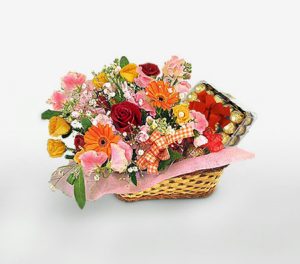
If the way to a man’s heart is through his stomach, the way to a woman’s heart is definitely through flowers. And with Women’s Day and the various women in your life, lovers, mothers, co-workers to felicitate and celebrate, think flowers, and they (and you) will not be disappointed. Based on your relationship to the recipient gifting them a floral arrangement is the best way to show you care. For your girlfriend or wife, think Red Roses (and lots of them). For your mother dearest, combine a colorful Rose bouquet with Gerberas, to tug at her heartstrings. If it’s a co-worker or boss you want to show appreciation for, think of a bouquet/arrangement with fresh seasonal flowers.

The trick to perfect floral gifting on Women’s Day is assessing your relationship with the recipient. Make sure the appropriate flowers go to the right person and you’re good…
Mother’s Day
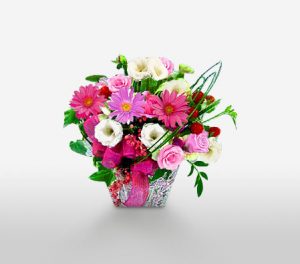
All of us, wherever we are in the world, value and treasure our mother. Could the Japanese be any different? & Mother’s Day coincides with that time of the year when flowers are in full bloom. It just fits together perfectly to appreciate your mum then with the choicest of flowers. While Roses in Red, White or Yellow are excellent gifts on their own; teaming them up with Gerberas and Carnations or seasonal flowers elevates their beauty and takes symbolism to another level. Another splendid of showing your Mom how much she means (and a break from the traditional) is a heartwarming gift of an Phalaenopsis Orchid Plant. A basket or hamper of Fresh Fruits along with your floral arrangement, will also make for a perfect Mother’s Day Gift.

Traditional Japanese flower arrangements are a wonderful way to express your feelings, always inquire with your florist if such an arrangement with the prescribed flowers is possible.
Parents Day – 1st June Every Year
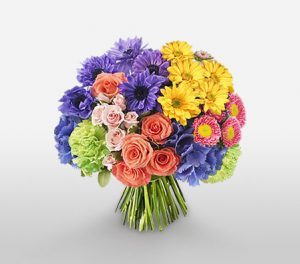
The fulcrum of traditional life in Japan is the family. Parents are considered to be the center point of the family and as such are held in high esteem. Honoring parents on this day is therefore one of the most sacred and solemn occasions in Japan. Familial bonds are celebrated on this day with enthusiasm and love. Since it is the beginning of the monsoon season in Japan, these celebrations are normally indoors and this means that flowers and floral arrangements are an integral part to both the gifting and decor aspect. Parents Day floral arrangements are populated by flowers like Delphiniums, Carnations, Dendrobiums & Delicate Phalaenopsis Orchids with other Seasonal Flowers.

Seasonal flowers at the beginning of the monsoon season are the best way to go, simply because they add a splash of color and life to the proceedings.
Father’s Day
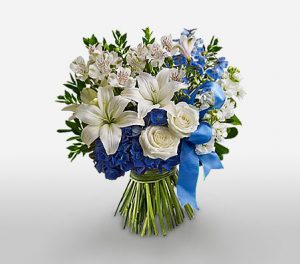
A father is always the one who gives you important lessons in life. On occasion of Father’s Day, it’s your turn to show him appreciation for those valuable tips. Celebrating Father’s Day in Japan and want to show him your love, do it with flowers. The options are form a wide array of flowers, means you are spoilt for choice. While the Rose (in Red, White or Yellow) will show your love and gratitude., teaming it with Lilies, Alstroemeria, Gerberas, Chrysanthemums, Carnations, Hydrangeas and others will make a definitive statement of care and appreciation. Want to do something different? Think Cakes! Orange Chocolate or Mango Cheesecake. Or even a Fresh Fruit Hamper… why not?

When choosing a floral arrangement to felicitate your father with, teaming it up with a gift of something that he has a soft spot for like Cheese, Scotch or even a Cake would be an amazing idea.
Christmas
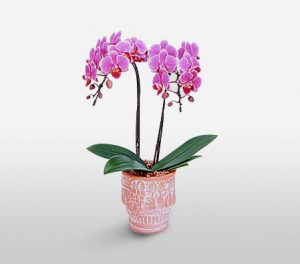
Christmas in Japan (much like anywhere) is a celebration with family. It is definitely one of the more popular festivals and gifting your friends, family and loved ones with flowers is one of the best ways to celebrate it. Looking for the ideal flowers, that’s easy… Red, White and Pink Roses are the flavor of the festival as they symbolise love. Carnations, Alstroemeria, Gerberas, Hydrangeas are all a wonderful supporting cast to the holiday bouquet. Think of an edible gift like a Fresh Fruit Hamper or Cakes such as Orange Chocolate and Mango Cheesecake to lend a celebratory flavor to the season.

Christmas is an incredibly popular holiday in Japan, and is also at the peak of the coldest season. This means that popular flowers are in short supply the closer you get to the date. Therefore ensure that you arrange for your floral gifts a few weeks to a month in advance to avoid disappointment.
How To Get It Right When Choosing Flowers For Different Occasions?
Gifting flowers is by far one of the most thoughtful things you can do for the people you love. Choosing flowers for different occasions though can be a tricky call. And so here are a few simple tips to avoid making common mistakes when gifting flowers for different occasions.
Birthdays

Birthdays in Japan, much like in the West, is an important day in a person’s life. It’s an occasion where family and loved ones come together to make the day special for him/her.
The flowers to go with: You can never go wrong with Roses. White, Red or Yellow depending on your relation with the person whose birthday it is.
Combinations: Flowers and wine are an immortal combination, especially if it’s your spouse’s or lover’s birthday. For a friend a well thought gift is definitely the way to go.
Birthday Card Message Ideas: Get creative with your birthday message. The standard ‘Happy birthday’ message is done to death. Something like a funny haiku would fit the bill. Like ‘Wow, it’s your birthday /so let the wild rumpus start/ The boys can clean up’.
Arrangement Style: Japan is high on simplicity, therefore looking at a stylish yet simple hand tied bouquet is the way to go!

A beautiful hand tied arrangement of the recipient’s favorite flowers is definitely one of the classiest birthday gifts you could think of.
Weddings
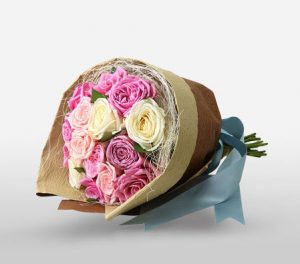
Weddings in Japan can be of two types, the traditional variety, which is a lot more sedate, and the Western type, which has a celebratory component to it. There’s no doubt however that both types of celebrations do necessitate the gifting of floral arrangements.
The flowers to go with: As is the case with any celebration of love, Roses are easily the most popular choice of flowers. In Japan, even Red Chrysanthemums, Carnations and Gerberas of myriad colors are all considered celebratory and symbolic of romantic love and may be proffered as wedding gifts or floral themed centerpieces.
Combinations: There exist several number of wedding gift shops that cater to gifts for the couple. Combining these with a floral arrangement is always a good idea.
Greeting Ideas For Weddings: Greeting cards are not the norm in Japan, but a simple thoughtful honorific addressed to the couple is said to be highly desired. “You honor us by including us in the celebration of your love. We pray for many years of happiness for you. Congratulations on this auspicious day.”
Arrangement Style: Classy bouquets in the Ikebana style (traditional Japanese art of flower arrangement) are the way to go.

It’s advisable to choose seasonal flowers for a wedding bouquet. Keep in mind, both the bride and the groom’s favorites, and use a complementary combination for the best result.
Funerals
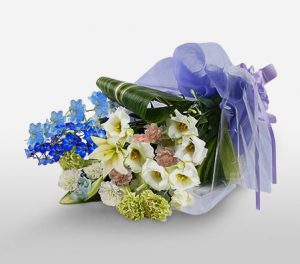
Funerals in Japan are a sombre, sober affair where the family and community come together to commemorate the life journey of the deceased. Floral tributes, bouquets and floral arrangements are considered to be an appropriate offering to the deceased’s family.
The flowers to go with: Like in most other cultures White flowers are supposed to be appropriate tokens of respect. White Roses, Chrysanthemums, Lilies and even Red Spider Lilies are considered apt for funerals.
Condolence Messages: A handwritten condolence message is the way to go. Something to the effect of “We stand with you in your hour of grief. He/She will surely be missed. Our heartfelt condolences.”
Arrangement Style: Wreaths and sprays are the preferred style of bouquet as they can be placed directly on the coffin or grave,

White flowers are the choicest at a funeral. When getting your Wreath or Spray made, insist on the most flawless flowers possible, as even the slightest blemish can be treated as a mark of disrespect.
Where Do Flowers In Japan Come From?
Japan is one of Asia’s most advanced economies and as such is self sufficient, and also home to a significantly large flower growing industry. Local flowers such as Chrysanthemums, Sakura and others are always in high demand. However Roses from China, India, Central and South America and some parts of England are also in high demand. Tulips, Daisies and other European flowers have also seen a steady growth over the past few years. In the near future it is estimated that the Japanese market will be opening up to flower varietals from Nigeria, Ghana and Kenya as well.
Top Tips To Consider When Buying Flowers To Gift
- Always check the flowers for defects: The Japanese are very particular about aesthetic appeal and it is a serious social faux pas if your floral arrangement is anything short of perfect. So make sure you examine every flower carefully for defects before they are arranged into a bouquet.
- Fresh and local over exotic: Fresh, and seasonal local flowers hold deep symbolic and emotional meaning for the Japanese. Exotic flowers are high in demand but they are not as desirable as something that resonates with the people as much as local flowers do.
- Always take into account the recipient’s likes and dislikes: Sometimes even the most well intended gifts can go horribly wrong, because you do not take into account the recipient’s taste and preferences. Remember to ask people close to the recipient about the flowers they like before you purchase.
- Research the meaning of flowers: Do a little reading on the meaning of flowers before you shop for them. For instance, you should never send a bouquet of Red Spider Lilies to a celebration or birthday in Japan as it is considered a bad omen, given that Red Spider Lilies are normally planted on grave mounds.
Care Tips For Your Newly Delivered Flowers
- As soon as you receive the flowers take them out of their wrapping material and put them in a vase.
- Ensure that the vase is stocked with filtered water.
- Every few days refill the vase with fresh water.
- Prune the stems every few days in order to keep the flowers fresher.
- Cut flowers cannot stand heat and humidity, so keep them away from direct sunlight and heat releasing appliances.
- To make the flowers last longer follow the care instructions that come with the bouquet.
- Sugar, vitamin C, aerated drinks act as fantastic revitalizes; and adding some to the water in the vase is a good idea to provide the cut flowers with some nutrition.
Conclusion
The Japanese culture is a warm, formal albeit confusing one. The emphasis on social conduct and etiquette can sometimes make gifting flowers (a seemingly innocuous process) seem like a challenge. Well with these simple tips and tricks, you can now impress your Japanese family, friends or business contacts and acquaintances with the appropriate floral arrangement for the appropriate occasion.